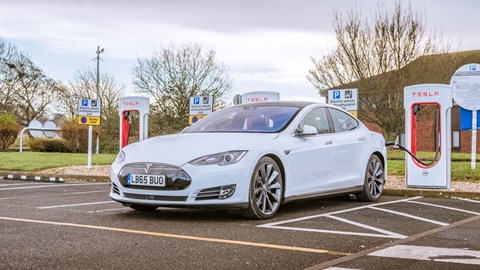► £1.3 billion for vehicle charging points
► £582 million for zero or ultra-low emissions vehicles
► '300 million tonnes' of carbon dioxide to be saved by 2030
Chancellor of the Exchequer, Rishi Sunak, has announced billions of pounds in funding for motorists in what he describes as a 'once in a generation investment in infrastructure.'
This is Sunak's first spending review against the backdrop of an economy ravaged by the effects of Covid-19. And in between announcements about public sector pay freezes and cuts to overseas aid, his Commons statement announced measures to support Boris Johnson's 10-point plan to drive carbon emissions to 'net zero' by 2050 that were revealed earlier in November.
This £12 billion plan includes £1.3 billion to roll out electric vehicle charging points, as well as £582 million that will be used for grants for zero or ultra-low emissions vehicles.
The government says the measure will support 40,000 new jobs by 2030 and save 300 million tonnes of carbon dioxide.
Sunak said: 'Today's spending review delivers on the priorities of the British people. The immediate priority is to protect people's lives. But today's spending review delivers a once in a generation investment in infrastructure.'
CEO of Roadmender Asphalt, Harry Peal, was quick to point out that being greener means more than simply committing to electric cars. He commented: 'This new green plan will revolutionise the way that roads and the wider infrastructure is both produced and maintained. The processes and materials used to build and maintain roads will have to become more sustainable.'
Anything else?
Dishy said there will be a new UK infrastructure bank set up in northern England. This will be responsible for working with the private sector to finance major new projects across the UK.
He couldn't not mention the 2030 petrol/diesel ban either. Under heavy fire about Britain's GDP losses when compared with countries on the continent, Sunak pointed out that Team GB was beating the French in becoming green, as France's petrol/diesel ban is not due until 2040.
March budget 2020
► Road expansion and pothole repairs
► Plug-in Car Grant extended, but with strings
► Fuel duty and car tax remain unchanged
It’s a tough job, but someone needs to do it. New Chancellor of the Exchequer Rishi Sunak’s first budget was a trial by fire given the backdrop of an ongoing Coronavirus crisis and the aftermath of the UK’s exit from the EU. So, it’s no surprise to see that drivers have been largely left alone, with fuel duty and VED rates remaining unchanged.
However, if you’re considering an electric car or the roads are bad where you live, there’s plenty of good news in the Budget. Clearly, the Government wants more people to take up an electric car from April, with the Benefit-in-Kind changes and further extension of the Plug-in Car Grant making it less costly than it needs be to make the change.
There haven't been any major changes affecting UK drivers. Although there aren't any changes to the current system of Vehicle Excise Duty (VED) that has been in place since 2017, there are a number of incentives aimed at stimulating car sales, especially electric cars. Also, road building will benefit following the announcement of a £600 billion cash injection into infrastructure spending.
Read on for the key announcements made today by the new Conservative Government.
Budget 2020
The government-funded Plug-in Car Grant has been extended to 2023. It was due to end in April 2020, but understandably it has been extended to encourage more buyers to take the plunge as the government races towards its 2035 ban on the sale of all ICE-powered cars.
But it’s not all good news. The amount being offered has been reduced – it now stands at £3000, having dropped from £3500. In addition, the grant has also been removed from all cars costing more than £50,000, leaving more expensive EVs looking a little less appealing than they did before. Big losers are the Tesla Model S and Model X, the Jaguar I-Pace, Mercedes-Benz EQC and Audi E-Tron.

The grant was introduced in 2011 and its extension has been well-timed. It coincides with the announcement that Benefit-in-Kind has been reduced to zero on all EVs sold to business users after April 2020. The two measures are expected to kick-start electric car sales in the UK, and significantly add to the 200,000 government-subsidised sales that have already taken place.
When the Plug-in Car Grant was introduced in 2011, it was set at £5000. It was then reduced to £4500 before dropping again to £3500 in 2018. It was unclear if the government was going to continue with the scheme beyond March 2020, so although the amount offered is now reduced, it’s extended to at least 2023, which is very good news for EV sales.
The rates of all of the plug-in vehicle grants are 'subject to review over time, depending on how the market develops', the Department for Transport confirmed after the Budget.
The extension of the scheme provides stability in the electric car market, as there were some previous worries the government could pull the plug on the scheme. The removal of the grant for more expensive EVs is a blow, especially for British car company Jaguar, which only offers the I-Pace, which is prices well beyond the £50,000 cut-off.
More incentives to buy an electric car
Electric vehicles won't pay any road tax at all either, giving them a distinct advantage over petrol and diesel models. The Government is keen to support EVs and make Britain a hotbed of electric car tech. These changes mean if you're planning for your next EV or PHEV, then you don't need to feel like you're going to rush or miss out on your grant.
Best electric cars you can buy
£500m for car charging hubs
Sunak has promised to spend £500m on charging hubs for electric cars. We all know the UK infrastructure isn’t cutting the mustard right now, and if we’re about to see more EVs on the road, then we need to be prepared. He wants drivers to never be more than 30 miles away from a rapid charging hub.
Infrastructure is about to get a boost
Before the budget, Rishi Sunak had confirmed that there would be significant investment made in the roads. He said: 'by investing historic amounts in British innovation and world-class infrastructure, we will rebalance opportunities and lay the foundations for a decade of growth for everybody.'
That means more new roads, improvements to existing ones and there will be £2.5bn more to fill-in potholes.
Fuel duty
Fuel duty has been frozen in the Budget for the 10th year running. Although fuel prices are high in the UK, the amount the government takes in tax has remained constant since 2010, when the old 'fuel price accelerator' was scrapped. Currently, crude oil prices are dropping, which should actually mean a drop in petrol and diesel prices at the pumps.

Vehicle Excise Duty (VED)
The good news is that VED rates remain unchanged following the big overhaul back in 2017.
Company car tax
Benefit in Kind rates have already been announced for 2020/2021, and nothing in the Budget has changed these.